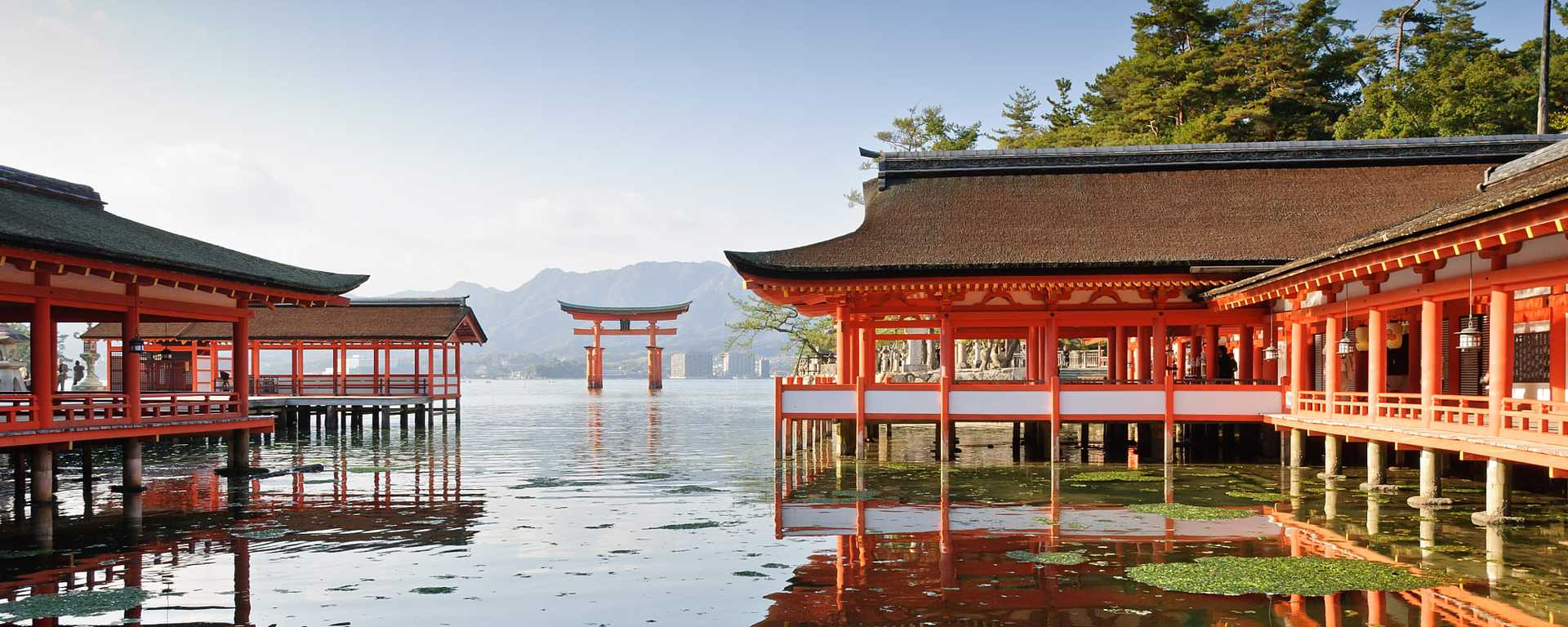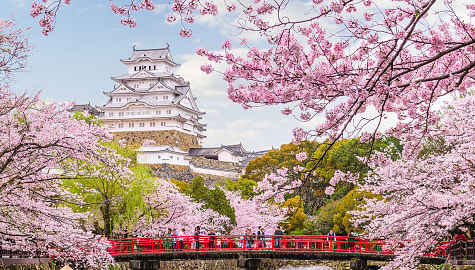
Japan Tours for Seniors
Timeless beauty surrounds as Japan celebrates tradition while looking into the future. With a natural fusion of ancient heritage, lush wilderness, and futuristic vision, Japan is an ideal destination for senior travelers. Popular with Zicasso travelers ages 65 and up, you can discover the cities and countryside with ease. Whether wishing to explore Shinto temples or savoring the cherry blossoms, discover Japan’s endless possibilities with the sample itineraries below and find more helpful information in our Japan Travel Guide as you consider your trip.
Explore Our Trip Ideas
Let these itineraries inspire your personalized travel experience

7 Day Trip IdeaFrom $4,900
Idyllic Japan Tour for Seniors in One Week

14 Day Trip IdeaFrom $9,100
Discovering the Past and Present of Japan Tour

7 Day Trip IdeaFrom $4,600
Best of Japan Itinerary in Seven Days

10 Day Trip IdeaFrom $7,500
Shogun Inspired Heritage & Traditions of Japan Tour

14 Day Trip IdeaFrom $9,100
Discovering Sacred Sites & Preserved Traditions of Japan Tour

15 Day Trip IdeaFrom $9,800
Essence of Japan Tour: An Expertly Guided Experience
How Zicasso Works
Here's how we create life-enriching, luxury travel experiences
1.Share Your Travel Dreams
Zicasso specializes in custom tours, vacations, and safaris tailored to your interests and preferences. From private African safaris to culinary experiences in Europe, submit a trip request to share your ideas and travel style.
2.Meet Your Travel Specialists
To ensure a personalized experience, we'll carefully handpick and introduce you to two of our top travel specialists, each with unsurpassed destination knowledge and local insight aligned to your luxury travel dreams.
3.Design Your Perfect Journey
Compare the expertise of two specialists with itineraries crafted exclusively for you. You can refine these further and choose your preferred proposal. Our unique process ensures a more creative, personalized, and expertly crafted trip.
More Tours for Seniors Near Japan
Reviews of Zicasso's Japan Tours for Seniors
Based on 653 verified traveler reviews.
We (A and B) had an amazing, once-in-a-lifetime, 36-day trip to Japan and were very grateful we found Zicasso’s travel specialist to help us plan our itinerary.
The travel specialist made sure that all our travel arrangements were well thought out and his instructions were (mostly) straightforward. He was a good listener and helped us craft an itinerary that totally suited our needs. We had about four sessions (hours) on Zoom with him before our trip to iron out details. A company that does customized tours was exactly what we were looking for and that is what we got. This way, we had a lot of say in where to go, how long to stay, how we wanted to spend our time, and what attractions we wanted to see. He told us ours was the longest trip to Japan he had helped arrange.
The trip was amazing and we were blessed to be able to see the spectacular fall foliage everywhere we went, Mount Fuji on numerous days, and many beautiful places, as well as eat authentic Japanese food and immerse ourselves in Japanese culture. In addition to all that, we had many days on our own where we were able to meet up with 12 friends of B in three different cities, people B met 45 years ago in Japan.
All the arrangements made for us by the travel company were fantastic, including local transportation, drivers in every city, and train and shinkansen rides. The accommodations were excellent too and we especially appreciated that the location of our hotels was very convenient and in the best areas. The two stays in ryokans in Hakone and Miyajima were unique and special.
Every single local guide we had was fantastic. They were all knowledgeable, friendly, personable, helpful, and kind. The drivers were terrific too and we enjoyed meeting them and talking with them.
We highly recommend this travel company if you are looking for a customized, comprehensive, and fun tour of Japan.
See more
The itinerary was perfect. We appreciated the variety of sites and the wonderful guides arranged by Zicasso's travel company.
See more
I will start by saying this is the first time I have ever used a travel company of any sort. I have always booked all of my own hotels, Airbnbs, flights, trains, and tickets for activities, etc. I have booked tours with tour guides, transportation, and excursions, but never left it up to a tour company to handle all of the details, start to finish. Needless to say, I was nervous. I was nervous I would land in Japan to no driver, no hotel, no guide, no tickets to activities on our “must-do” lists that get sold out—just my money gone and us stranded. I am used to the comfort of confirmations and control.
That is so far from the experience we had. Everything was fantastic! Our driver messaged us the night before landing with exact instructions on where to meet him, with pictures of how to navigate the airport. All three of the hotels we stayed in were clean, really nice, and exactly the type of rooms I requested. I have a very tall husband and two teenagers. King-size beds are hard to find in Japan, so I was very firm on wanting a king bed for us, but still the twin bedrooms for our kids.
Our first guide in Tokyo spoke fantastic English. He also did an amazing job of just doing what we wanted to do, even if it wasn’t on the itinerary. We were so appreciative of his flexibility because we did not stick to the itinerary at all, other than the ticketed activities. He took us to some restaurants that were local, not just those in tourist areas. He never rushed us, but still ensured we made it on time to the ticketed activities that had entry times. One night, our daughter realized she had left her purse in the bathroom and the driver drove us back 30 minutes to get it without an ounce of complaint or hesitation, even though it had been a long day and that now added another hour to his day. We even said we would take a taxi so he could go home, but he refused to let us and drove us personally.
Our second guide was in Kyoto. This is where we wanted to do the most sightseeing. He had no shortage of knowledge on the history of Japan. He was a walking Google for all things Japanese history. He did an excellent job switching up the itinerary when we discovered some things were closed for the New Year holiday. He took us to some more local and less-touristy places to eat as well.
I only needed to contact Zicasso’s travel company one time during our week. It was the night before our departure for the airport to confirm the driver, as this was the first time the entire trip I had not been contacted by a driver or guide the day before a departure or meeting. She responded within 30 minutes. The driver then contacted me within another 30 minutes. Otherwise, I was always contacted directly by each guide or driver the day before, with details of their arrivals and any other information.
It really was an excellent experience and I would highly recommend the company to anyone traveling in Japan or other areas in Asia where they provide travel services.
See more
Zicasso’s travel specialist did a fabulous job planning our 12-day trip to Japan! We took our two kids (12 and 14 years old) and worked together to come up with such an amazing and fun itinerary covering all of our interests.
In addition to seeing the sights around Tokyo and Kyoto, the travel specialist found us classes in and outside of the cities for sushi-making, Shibori fabric dyeing, and bamboo basket-making. We had the most wonderful guides, drivers, and translators take us to an organic green tea farm (an unexpected favorite!) and even managed to get tickets to the Ghibli Museum.
We had a phenomenal time and I look forward to working with this travel company again.
See more
Zicasso’s travel specialist is amazing! She went out of her way to plan the best trip for 11 of us to Japan. She listened and understood exactly what we wanted. She is sweet and truly cares. Not only this, but she responds quickly.
As an added bonus, the travel company was reasonable, especially for all that was included. We were spoiled and had a driver and guide for most of the trip, so we did not have to worry about anything. We were also booked at lovely hotels, with delicious breakfasts and spacious rooms.
We absolutely loved our guide in Osaka and Kyoto. She was wonderful! She even got us hand warmers and gifts for Christmas! She was relaxed, positive, and went with the flow. She stayed later at times for us too! Our driver in Tokyo was able to get us a last-minute restaurant reservation for lunch because there was one more type of food we wanted to try there. He was very kind and flexible with us in Hakone too. Our guide in Tokyo was also very nice! Thank you to the team for our trip of a lifetime!!!!!
See more
Working with Zicasso’s travel specialist was a pleasure the whole way through. He catered our Japan trip to our budget and interests, and delivered the trip of a lifetime. My wife and I had an absolute blast on the trip—we stayed in amazing hotels in fun areas, had awesome activities planned, and leveraged the super-helpful recommendations to get the most out of the experience.
Another great thing about working with the travel company was having all of our train tickets prepared for us when we landed. We were given a very organized packet of information on the cities we were staying in, with all of our train tickets organized chronologically and a pre-filled subway card that we added to our phones for easy access. This made travel so much easier and helped us on our adventure.
Overall, I would highly recommend working with Zicasso and this tour operator to anyone planning a big international trip.
See more


